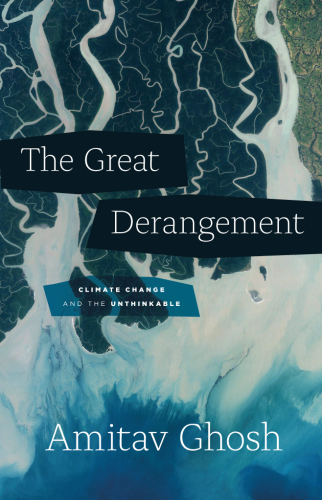
The Great Derangement
Climate Change and the Unthinkable
کتاب های مرتبط
- اطلاعات
- نقد و بررسی
- دیدگاه کاربران
نقد و بررسی

Starred review from August 1, 2016
In his first work of long-form nonfiction in over 20 years, celebrated novelist Ghosh (Flood of Fire) addresses “perhaps the most important question ever to confront culture”: how can writers, scholars, and policy makers combat the collective inability to grasp the dangers of today’s climate crisis? Ghosh’s choice of genre is hardly incidental; among the chief sources of the “imaginative and cultural failure that lies at the heart of the climate crisis,” he argues, is the resistance of modern linguistic and narrative traditions—particularly the 20th-century novel—to events so cataclysmic and heretofore improbable that they exceed the purview of serious literary fiction. Ghosh ascribes this “Great Derangement” not only to modernity’s emphasis on this “calculus of probability” but also to notions of empire, capitalism, and democratic freedom. Asia in particular is “conceptually critical to every aspect of global warming,” Ghosh attests, outlining the continent’s role in engendering, conceptualizing, and mitigating ecological disasters in language that both thoroughly convinces the reader and runs refreshingly counter to prevailing Eurocentric climate discourse. In this concise and utterly enlightening volume, Ghosh urges the public to find new artistic and political frameworks to understand and reduce the effects of human-caused climate change, sharing his own visionary perspective as a novelist, scholar, and citizen of our imperiled world.

Fair warning on the perils of ignoring climate change.In this erudite, cautionary treatise, novelist Ghosh (Flood of Fire, 2015, etc.) questions why, even in the face of mounting proof, much of the general public remains unfazed by increasing environmental disruption and disintegration. He recalls, as a child, hearing a tale from the mid-1850s about the "ecological refugees" from his Bangladesh homeland being displaced after the Padma River suddenly changed direction, wiping out villages and their inhabitants. As that story and those he shares in the book's first section prove, the planet's natural elements, which many of us take for granted, "can come to life with sudden and deadly violence." Originally begun as a set of four lectures at the University of Chicago in 2015, the book lays out the reasons for and ramifications of climate crisis denialism through three distinct yet interrelated sections: stories related to "global warming's resistance to the arts" coupled with the history and the serpentine politics surrounding our shared environmental responsibility. Interestingly, Ghosh shares tales of "people who are waylaid by unpredictable events" and then references literature's oversight and casual disregard for unpredictable, "improbable" weather phenomena. As he writes, "to introduce such happenings into a novel is in fact to court eviction from the mansion in which serious fiction has long been in residence." Just as eloquently, the author incorporates a historical discussion into his hypothesis, spotlighting Asia's swiftly expanding industrialization as "conceptually critical to every aspect of global warming," as well as the multifaceted aspects of capitalism, colonization, the "carbon-intensive economy," and the corporatization of climate change. In direct, streamlined prose, Ghosh nimbly assesses the calculated placement of ecological blame, from politicians and world leaders to artists and writers, upon whose shoulders the "existential danger" of climate erosion potentially rests. A slim but certainly significant contribution to the climate crisis dialogue sure to provoke discussion and increased awareness about our imperiled planet. COPYRIGHT(1) Kirkus Reviews, ALL RIGHTS RESERVED.

August 15, 2016
Fair warning on the perils of ignoring climate change.In this erudite, cautionary treatise, novelist Ghosh (Flood of Fire, 2015, etc.) questions why, even in the face of mounting proof, much of the general public remains unfazed by increasing environmental disruption and disintegration. He recalls, as a child, hearing a tale from the mid-1850s about the ecological refugees from his Bangladesh homeland being displaced after the Padma River suddenly changed direction, wiping out villages and their inhabitants. As that story and those he shares in the books first section prove, the planets natural elements, which many of us take for granted, can come to life with sudden and deadly violence. Originally begun as a set of four lectures at the University of Chicago in 2015, the book lays out the reasons for and ramifications of climate crisis denialism through three distinct yet interrelated sections: stories related to global warmings resistance to the arts coupled with the history and the serpentine politics surrounding our shared environmental responsibility. Interestingly, Ghosh shares tales of people who are waylaid by unpredictable events and then references literatures oversight and casual disregard for unpredictable, improbable weather phenomena. As he writes, to introduce such happenings into a novel is in fact to court eviction from the mansion in which serious fiction has long been in residence. Just as eloquently, the author incorporates a historical discussion into his hypothesis, spotlighting Asias swiftly expanding industrialization as conceptually critical to every aspect of global warming, as well as the multifaceted aspects of capitalism, colonization, the carbon-intensive economy, and the corporatization of climate change. In direct, streamlined prose, Ghosh nimbly assesses the calculated placement of ecological blame, from politicians and world leaders to artists and writers, upon whose shoulders the existential danger of climate erosion potentially rests. A slim but certainly significant contribution to the climate crisis dialogue sure to provoke discussion and increased awareness about our imperiled planet.
COPYRIGHT(2016) Kirkus Reviews, ALL RIGHTS RESERVED.

























دیدگاه کاربران